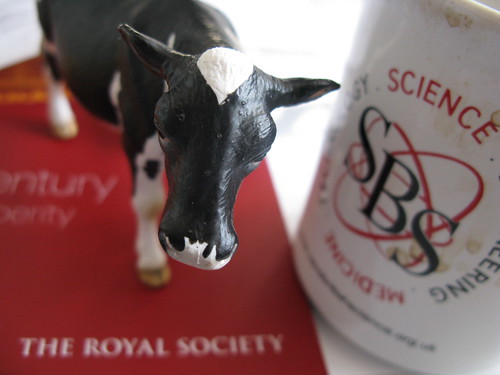The argument for greater scientific literacy is that to meaningfully participate, appreciate and even survive our modern lives, we all need certain knowledge and skills about science and technology. Ok. But what will this look like exactly, how will you know what we all need to know in advance and how on earth do you expect to get people trained up? These are serious problems.
Back in the early 1990s, Jon Durant very usefully outlined out the three main types of scientific literacy. This is probably as good a place to start as any:
- Knowing some science – For example, having A-level biology, or simply knowing the laws of thermodynamics, the boiling point of water, what surface tension is, that the Earth goes around the Sun, etc.
- Knowing how science works – This is more a matter of knowing a little of the philosophy of science (e.g. ‘The Scientific Method’, a matter of studying the work of Popper, Lakatos or Bacon).
- Knowing how science really works – In many respects this agrees with the previous point – that the public need tools to be able to judge science, but does not agree that science works to a singular method. This approach is often inspired by the social studies of science and stresses that scientists are human. It covers the political and institutional arrangement of science, including topics like peer review (including all the problems with this), a recent history of policy and ethical debates and the way funding is structured.
The second of Durant's approaches to scientific literacy might make more sense then, but there are problems here too. Firstly, there is what Cohen dubs "The fallacy of critical thinking". Science isn't necessarily a transferable skill. This is easily demonstrated by examining carefully the lives of scientists outside of the laboratory (or, to put it another way: "yeah, cos scientists are all sooo well organised outside of work, living super-rational evidence-based lives, all the time"). It would be lovely if we could provide a formula for well-lived lives, but people just aren't that consistent.
There is also the matter of whether you believe science works to a singular "scientific method". That in reality science isn't "a" way of thinking, but many; enacted under quite local conditions (which are influenced by ideas like those of Popper, Bacon et al, but "method" is only part of it). This is largely the thinking behind the third approach to scientific literacy: "how science really works". I have a problem with this too, one it shares with all three: it's too didactic. It replaces an idea that the public are deficit in scientific information with an idea that they are deficit in sociology of science. It is just as unrealistic (if not more so).
One of the neatest arguments against calls for scientific literacy is Jon Turney's 2003 response to Susan Greenfield. It has a particularly good ending:
Work to promote scientific literacy so everyone is up to speed, empowered and ready to contribute to the great debates about science, technology and the future? No. Invite them to participate, and really mean it, and they will find the motivation to become as scientifically literate as you, or rather they, please.This echos a key problem many people have with the scientific literacy approach. It is too top-down. You might be able to talk about scientific literacy in an educational context (i.e. for children in compulsory education), but adults will simply feel patronised and so won't listen.
I'd also argue that a scientific literacy approach tackles the problem the wrong way around. It would be lovely if we could live in a world where "everyone is up to speed, empowered and ready to contribute", but you can't prepare for scientific controversies like that. Do we want to view each science story through the lens of older ones (cough, Simon Jenkins). Maybe prevention would be better than a cure, but I don't think it is possible in this context; medical metaphors perhaps being as inappropriate here as "literacy". Rather, let's provide structures where non-experts can learn about science as and when they become important to them. As Turney says, "Invite them".
Although I like Turney's piece a lot, I do also understand the frustration people feel when they see what they feel is a lack of scientific training. I was prompted to write this blogpost after recent comments made by Julian Huppert; that MPs to be required to take a crash course in basic scientific techniques (see also Liberal Conspiracy piece in support). Do we really want elected politicians to "become as scientifically literate as they please"? We might argue that MPs, like schoolkids, should just be told to turn up and listen. But as anyone who has worked in a school will tell you, compulsory attendance is only part of the battle.
Mark Henderson tweeted that he agreed with Huppert and the libcon piece that understanding methods of science would help politics. That it is the least understood thing about science outside science: most non-science graduates think of as body of facts, not as a way of thinking. Fair enough. But you have to believe these ideas, as well as understand them. This is one of the reasons why the UK science communication industry dropped the word "understanding" a while back, and why it is important to avoid confusing "understanding" with "appreciating" (or "knowing" with "liking", or "trusting" for that matter). Identifying what you think people should know about and actually getting them to (a) listen, (b) believe you and (c) apply it, are entirely different matters. As Huppert told the Independent, political leaders simply pay "lip service" to the importance of scientific proof. I worry that greater training in scientific literacy could simply provide a more extensive rhetoric. You want their hearts, not just their minds (or simply vocabulary).
I'd love it if there was a simple course we could send our elected officials on which would guarantee future science policy would be reliably high quality. Being educated in science (or even "about science") isn't going to do it. It's social connections that will. We need to keep our elected officials honest, constantly check they are applying the evidence we want them to, in the ways we want them to. And if the scientific community want to be listened to, they need to work to build connections. Get political and scientific communities overlapping, embed scientists in policy institutions (and vice versa), get MP's constituents onside to help foster the sorts of public pressure you want to see: build trust so scientists become people MPs want to be briefed by.
This, for me, is the true message of "understanding how science really works". That science is not only done by, but advocated by networks of human beings. Rather than training people up in the sociology of science (cough, Harry Collins), we should go out and do some "applied sociology": build those networks through action and debate.
This is just a brief sketch of the basic problems with scientific literacy (yes, this was the brief version). If you are interested in more, I can recommend the following. They are all a bit old. It is an old argument.
- Bauer, Martin, Nick Allum & Steve Miller (2007) What can we learn from 25 years of PUS survey research? Liberating and expanding the agenda, Public Understanding of Science, vol. 16(1): 79-95.
- Durant, Jon (1993) What is scientific literacy? in Jon Durant and Jane Gregory (eds) Science and Culture in Europe (Science Museum: London).
- Einsiedel, Edna (2005) Editorial: Of Publics and Science, Public Understanding of Science, vol. 16(1): 5-6.
- Gregory, Jane & Steve Miller (1998) Science in Public: Communication, Culture and Credibility (New York & London: Plenum). See p. 16-17 for IB Cohen's "fallacies".
- Millar, Robin (1996) Towards a science curriculum for public understanding, School Science Review, vol.77 no.280: 7-18.




